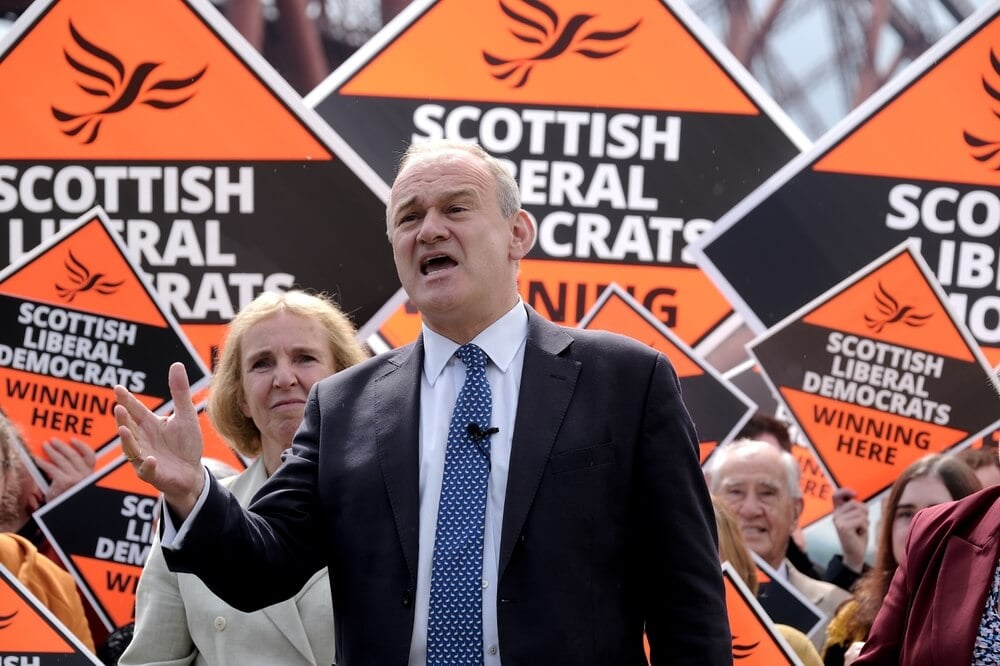An ill-tempered British election campaign is entering its final week with the ruling Conservative party having effectively conceded the inevitability of an opposition Labour victory.
By mid-campaign, Grant Shapps, a senior cabinet minister, had already put a semi-official stamp on widespread defeatism within the party when he admitted a Conservative win was unlikely.
“I think that’s the realistic position, isn’t it?” he told an interviewer. “I live in the real world. So, you know, let’s not try and pretend black is white.”
With the Conservative campaign disintegrating amid its latest scandal, attention ahead of polling day on July 4 is focussed more on the bleak state of the party that has run the country for the past 14 years than on the prospects for a Labour government almost certain to replace it.
If Prime Minister Rishi Sunak had hopes of a last-minute narrowing of an overwhelming Labour lead in opinion polls, they faded with the revelation that people linked to the Conservatives, including two of its candidates, had allegedly used insider information to place bets on the date of the election before it was announced.
With votes yet to be cast, predictions range from a humbling loss for the Conservatives to an electoral wipeout from which it might never recover.
UK outside the trend among its neighbours
Whatever the final tally, Britain looks set to end up with a solid majority for a centre-left Labour government, with the diminished Conservatives holding second place as the official opposition in the 650-seat House of Commons.
That would once more set the UK outside the trend among its neighbours in some parts of Europe, where the traditional party hierarchy is fragmenting.
Such an outcome would have less to do with the essential moderation of the British voter than with the effect of a first-past-the-post electoral system that limits the prospects of insurgent parties of either the right or left.
In a constituency-based structure with no proportional representation, candidates routinely take seats with around a third of local votes in a system of winner takes all.
Boosted by the return of leading Brexit campaigner Nigel Farage as its leader, Reform aspires to capture as much as 20 per cent of the popular vote
In some nationwide surveys the right-wing Reform party is polling neck and neck with the Conservatives and yet is not tipped to secure more than a handful of parliamentary seats.
Boosted by the return of leading Brexit campaigner Nigel Farage as its leader, Reform aspires to capture as much as 20 per cent of the popular vote, although his recent claim that EU and NATO expansion was to blame for the Ukraine invasion may deter some otherwise tempted to back the party.
The only near certainty for Reform is Farage’s newly adopted constituency of Clacton, a heavily pro-Brexit town on the east coast. The one thing that might stop Farage there would be for his opponents, Labour supporters included, to vote for the Conservative incumbent as the less bad option.
Tactical voting
Such tactical voting has been a growing phenomenon in UK elections with the decline of life-long, class-based party loyalties. This time around, it may favour the centrist Liberal Democrats, forecast to almost match their one-time Conservative coalition partners in terms of seats in the event of a Conservative meltdown.
According to one recent projection, the LibDems could win as many as 67 seats as against Reform’s five, despite the latter’s slight advantage in opinion polls.
That would be another example of how the system limits the impact of nationwide protest votes for insurgent parties such as Reform when compared with the more solid constituency-based structures of the traditional parties.
 In some traditionally Conservative areas, the LibDems are likely to benefit from the votes of both disaffected Conservatives and Labour realists prepared to vote tactically - Ed Davey
In some traditionally Conservative areas, the LibDems are likely to benefit from the votes of both disaffected Conservatives and Labour realists prepared to vote tactically - Ed Davey
In some traditionally Conservative areas, the LibDems are likely to benefit from the votes of both disaffected Conservatives and Labour realists prepared to vote tactically.
In a campaign in which some of the most dire predictions of a Conservative wipeout have come from the party’s own media supporters, it has been argued that none of the 344 seats it held when Parliament was dissolved is totally safe.
One poll suggested Sunak could become the first British prime minister to lose his seat despite having held the Yorkshire constituency of Richmond and Northallerton in 2019 with an increased majority of 27,210 or 47.2 per cent of the vote. Even if he survives, a string of Conservative grandees are destined to tumble.
Sigh of relief
It is a campaign scenario in which Conservative spokespeople have expended as much effort in warning against the perils of a Labour supermajority as in exhorting the party to maintain the optimism that it might yet win.
The election results on July 5 are likely to be greeted by the general public with a communal sigh of relief rather than dancing in the streets.
The overwhelming attraction of Labour is that it is not the Conservatives, who after 14 years of political drama and scandals look to be finally on their way out.
Predictions of the Conservative party’s extinction are almost certainly overblown
Predictions of the Conservative party’s extinction are almost certainly overblown. It would continue to be the second biggest party, albeit with Reform snapping at its heels.
Post-election, attention will inevitably switch to how the likely incoming Labour government undertakes its programme to tackle the UK’s economic challenges.
The party leader and prime minister-in-waiting, Keir Starmer, may be crossing his fingers for something less than a supermajority. As the Conservative experience will have taught him: if you win too big, internal party factions will start to plot.